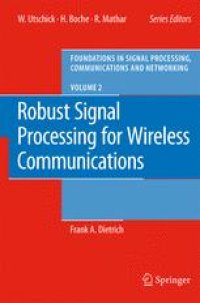
Ebook: Robust Signal Processing for Wireless Communications
Author: Frank A. Dietrich (auth.)
- Tags: Communications Engineering Networks, Computational Science and Engineering, Signal Image and Speech Processing, Statistics for Engineering Physics Computer Science Chemistry & Geosciences, Math Applications in Computer Science
- Series: Foundations in Signal Processing Communications and Networking 2
- Year: 2008
- Publisher: Springer-Verlag Berlin Heidelberg
- Edition: 1
- Language: English
- pdf
This book treats the robust design of signal processing algorithms for wireless communications which are based on an incomplete model of the propagation channel. The systematic treatment of this practical problem focuses on signal processing tasks in the physical layer with multiple antennas and relies on a description of the errors and uncertainties in the system's model. It applies principles of modern estimation, optimization, and information theory. Tutorial introductions to relevant literature and mathematical foundations provide the necessary background and context to the reader. The book contains detailed derivations and enlightening insights covering the following topics in detail:
- Training-based multiple-input multiple-output (MIMO) channel estimation
- Robust minimax estimation of the wireless communication channel
- Robust minimax prediction of the wireless communication channel based on the maximum Doppler frequency
- Identification of channel and noise correlations (power delay profile, spatial and temporal correlations, spatial correlations of interference)
- Interpolation of band-limited autocovariance sequences
- Robust linear and nonlinear precoding for the multi-user downlink with multiple antennas, which is based on incomplete channel state information or channel correlations (performance measures, duality, robust Tomlinson-Harashima precoding, nonlinear beamforming)
This book treats the robust design of signal processing algorithms for wireless communications which are based on an incomplete model of the propagation channel. The systematic treatment of this practical problem focuses on signal processing tasks in the physical layer with multiple antennas and relies on a description of the errors and uncertainties in the system's model. It applies principles of modern estimation, optimization, and information theory. Tutorial introductions to relevant literature and mathematical foundations provide the necessary background and context to the reader. The book contains detailed derivations and enlightening insights covering the following topics in detail:
- Training-based multiple-input multiple-output (MIMO) channel estimation
- Robust minimax estimation of the wireless communication channel
- Robust minimax prediction of the wireless communication channel based on the maximum Doppler frequency
- Identification of channel and noise correlations (power delay profile, spatial and temporal correlations, spatial correlations of interference)
- Interpolation of band-limited autocovariance sequences
- Robust linear and nonlinear precoding for the multi-user downlink with multiple antennas, which is based on incomplete channel state information or channel correlations (performance measures, duality, robust Tomlinson-Harashima precoding, nonlinear beamforming)
This book treats the robust design of signal processing algorithms for wireless communications which are based on an incomplete model of the propagation channel. The systematic treatment of this practical problem focuses on signal processing tasks in the physical layer with multiple antennas and relies on a description of the errors and uncertainties in the system's model. It applies principles of modern estimation, optimization, and information theory. Tutorial introductions to relevant literature and mathematical foundations provide the necessary background and context to the reader. The book contains detailed derivations and enlightening insights covering the following topics in detail:
- Training-based multiple-input multiple-output (MIMO) channel estimation
- Robust minimax estimation of the wireless communication channel
- Robust minimax prediction of the wireless communication channel based on the maximum Doppler frequency
- Identification of channel and noise correlations (power delay profile, spatial and temporal correlations, spatial correlations of interference)
- Interpolation of band-limited autocovariance sequences
- Robust linear and nonlinear precoding for the multi-user downlink with multiple antennas, which is based on incomplete channel state information or channel correlations (performance measures, duality, robust Tomlinson-Harashima precoding, nonlinear beamforming)
Content:
Front Matter....Pages i-xi
Introduction....Pages 1-10
Channel Estimation and Prediction....Pages 11-58
Estimation of Channel and Noise Covariance Matrices....Pages 59-119
Linear Precoding with Partial Channel State Information....Pages 121-179
Nonlinear Precoding with Partial Channel State Information....Pages 181-224
Back Matter....Pages 225-280
This book treats the robust design of signal processing algorithms for wireless communications which are based on an incomplete model of the propagation channel. The systematic treatment of this practical problem focuses on signal processing tasks in the physical layer with multiple antennas and relies on a description of the errors and uncertainties in the system's model. It applies principles of modern estimation, optimization, and information theory. Tutorial introductions to relevant literature and mathematical foundations provide the necessary background and context to the reader. The book contains detailed derivations and enlightening insights covering the following topics in detail:
- Training-based multiple-input multiple-output (MIMO) channel estimation
- Robust minimax estimation of the wireless communication channel
- Robust minimax prediction of the wireless communication channel based on the maximum Doppler frequency
- Identification of channel and noise correlations (power delay profile, spatial and temporal correlations, spatial correlations of interference)
- Interpolation of band-limited autocovariance sequences
- Robust linear and nonlinear precoding for the multi-user downlink with multiple antennas, which is based on incomplete channel state information or channel correlations (performance measures, duality, robust Tomlinson-Harashima precoding, nonlinear beamforming)
Content:
Front Matter....Pages i-xi
Introduction....Pages 1-10
Channel Estimation and Prediction....Pages 11-58
Estimation of Channel and Noise Covariance Matrices....Pages 59-119
Linear Precoding with Partial Channel State Information....Pages 121-179
Nonlinear Precoding with Partial Channel State Information....Pages 181-224
Back Matter....Pages 225-280
....